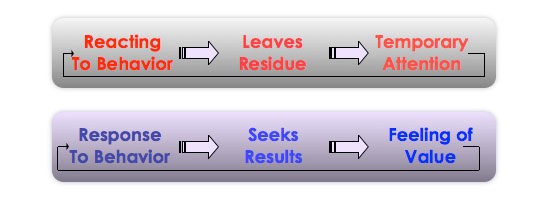We spoke of residue resulting from hardwired communication. I use the word residue because most people can relate. Residue is a feeling, something left over from an event. Leading up to, during and after communications we can feel either negative or positive residue. Sometimes both will come up. These emotions have a great deal to say about how we are hardwired.
Residue occurs when we engage in a conversation that involves strong emotions, words, gestures or physical harm – positive and/or negative. We will call this “reactive” if the feeling is negative and "responsive" if the residue is positive. The key is we become effected by the other's behavior and are blind to their true intentions. Blind because the cause or intention is usually hidden.
Both reactive or responsive residue can feel uncomfortable. It can feel the same or different to both people in a conversation. It can feel like an overall uneasiness, embarassement, entrapment, or shaming. It can feel seductive, peaceful, kind or beneficial. It can feel nauseating, draining or disrespectful. Regardless it feels personal and stays with us.
However, not everyone who acts negatively towards us creates residue. This is very important:
Only people who can take something from us can leave residue.
Only those who can bring forward "What's Missing" in us can leave residue.
This taking is not in the power of the offending person. This is located within our own hardwiring. And depending on our hardwiring we are hypersensitive to particular behaviors. If someone shows disapproval because you spilled your coffee in a restaurant you will feel reactive disapproval if that is hardwired. If not you may just ignore them with no disapproval feeling at all.
How do I know this is true? Because hardwiring is very personal. What shames you may not shame me. What disgusts me may seem natural to you. What you know people should believe, others may disagree with.
The key here is weather you feel something can be taken from you by the behavior of the other person. If their behavior brings up negative, reactive residue, the "What's Missing" in you wakes up and warns of impending doom. Your choice from a hardwired perspective is fight or flight.

Responsive behavior gets attention and almost always resolves or dissolves the problem. From this viewpoint the reactive person’s intention can be seen through their reactive behavior. A mother who is enraged at her daughter, after she has been missing for three days, can be seen as a less-positive response for relief. Seeing beyond the mother’s outer behavior to the inner response of love and caring can be learned. Change the event and we could be the reactive mother. Change it to another event and we could show compassion in the midst of the relief of finding the daughter.
Reactive behavior gets attention, but rarely resolves or dissolves the problem. It can be passive or aggressive. The important thing to remember is that reactive behavior is always about you - it is always about "What's Miassing" in you that is reactive given the behavior observed.
Value: Seeing past others reactive behavior allows you to use intentional language so they feel seen, understood, accepted, chosen and valued. We can change a reactive person into a responsive person.
Copyright © 2020 Scott Taylor Consulting All Rights Reserved.